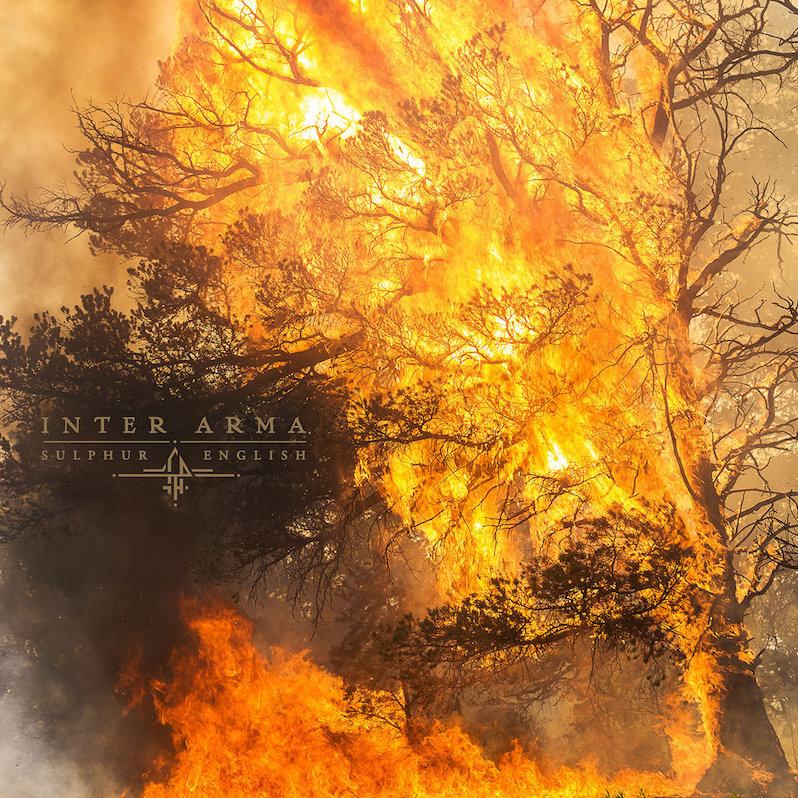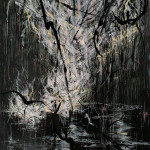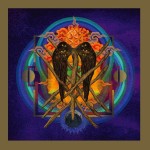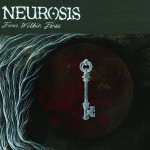Inter Arma – Sulphur English

Inter Arma aren’t what you think they are. It almost doesn’t matter what you think they are, they’re still not that. The Richmond, Virginia metal band has, since early on in their career, used heaviness more as an exploratory aesthetic tactic than as a means of defining themselves. Yes they’re heavy—extremely so—but in ways that “sludge” or “doom” have never felt sufficient enough to describe. That’s less of a liability today, when metal’s become such a complex and diverse set of sounds and scenes that branching out and tearing down tropes can only make a band ultimately stand apart from the tried, “true” and traditional. But Inter Arma’s greatest moments have always seemed to be the moments where they push those limits as far as they’ll go: the black-metal Americana of “The Long Road Home,” the doom-noir dirge “The Paradise Gallows,” the noise rock scrape of “‘sblood” or the searing psychedelia of “Summer Drones.”
The band’s fourth album Sulphur English isn’t the album that finds Inter Arma straying the farthest from their central core of volcanic low-end and soaring, epic arrangements, but it is one that still reveals some stunning surprises on the moments when they do take a stylistic diversion. Where Paradise Gallows and Sky Burial each revealed different aspects of the band, the former a psychedelic endtimes warning of sorts while the former was more spiritual in nature, Sulphur English is their most darkly emotional. It’s an angry record—the title a reference to the toxic language used by certain political figures—but it’s also a deeply personal one, vocalist Mike Paparo more directly addressing his own experience with depression.
Sulphur English is also incredibly, awesomely brutal. In just the first two tracks, Inter Arma reveals a relentlessness and furiousness that shows yet another evolution of their sound into a more death metal influenced direction. “A Waxen Sea” is abrasive and direct, all galloping blast beats and thunderous chug, while the standout first single “Citadel” is murky and menacing, with an OSDM groove backing Paparo’s own face-off with his internal demons: “Aloft in a storm of unseen anguish, where joy and sorrow entwine.” There’s a similarly harrowing aggression to the closing title track, a pummeling dirge of vitriol and venom, warning of the demagogues who seek to exploit our worst impulses: “Silence the gangrenous root of his abhorrent voice.” It’s not a nuanced argument, nor should it be; there’s no honor in playing nice with fascism, and Inter Arma aren’t here to humor any weak-willed cries for civility.
Inter Arma could have easily made an album’s worth of songs like “A Waxen Sea” or “Citadel” and it would still be one of the best metal albums of the year. They instead went well beyond that, opening up their sound more to reveal greater degrees of nuance that at times reveals some of their most achingly gorgeous music. “The Howling Land,” a pounding noise rock dirge reminiscent of Neurosis and Swans, isn’t necessarily one of them, but its apocalyptic, dissonant death march is one of the album’s most arresting moments. “Stillness,” though, is a gentler psychedelic folk song that gives Paparo an opportunity to showcase a more melodic and melancholy vocal style. The eerie “Blood on the Lupines,” meanwhile, treads into Badalamenti Black Lodge weirdness as it wades through a progression of nightmarish hallucinations. And while there’s little to no break in the manic assault of “The Atavist’s Meridian,” it’s a dense and intricate track with plenty of details to unravel for those willing to give it the time it deserves.
The seriousness and intensity of Inter Arma’s music is reflective of one of metal’s hardest working and most creative bands, though that too doesn’t define the entirety of who they are or what they do. Before their poolside live set at Psycho Las Vegas in 2017, the band roared through about 30 seconds of Van Halen’s “Hot For Teacher” before getting to the meat of their setlist. I’m pretty sure I let out a hearty chuckle, and I love that a band that so expertly harnesses darkness can do that. They’re not what you think they are—they’re far too interesting for that.
Similar Albums:
 Sumac – Love In Shadow
Sumac – Love In Shadow
 Yob – Our Raw Heart
Yob – Our Raw Heart
 Neurosis – Fires Within Fires
Neurosis – Fires Within Fires
Jeff Terich is the founder and editor of Treble. He's been writing about music for 20 years and has been published at American Songwriter, Bandcamp Daily, Reverb, Spin, Stereogum, uDiscoverMusic, VinylMePlease and some others that he's forgetting right now. He's still not tired of it.

